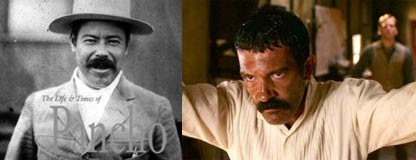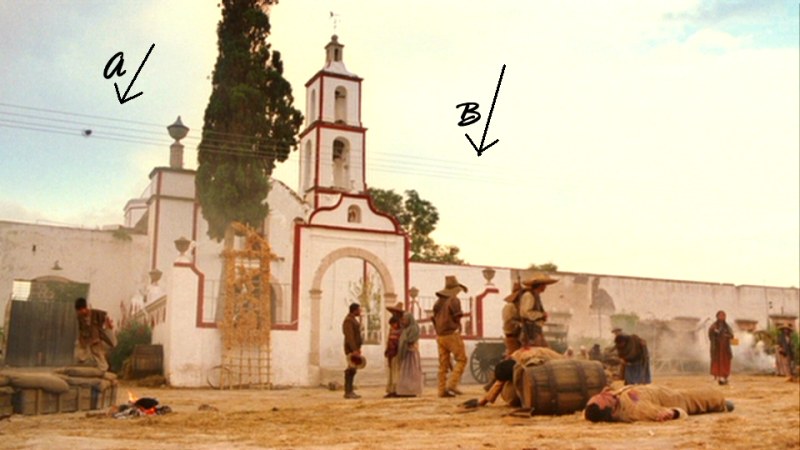|
Could there be a better choice to play Pancho Villa than Antonio Banderas? After all, both men are non-actors who have managed to create a movie career by playing themselves. It could easily be re-titled And Starring Antonio Banderas as Himself. On the other hand, Banderas did face a difficult challenge since the real Pancho Villa had more than one facial expression! Kidding aside, Banderas really did a remarkable job. Here is a picture of the real Pancho and Antonio-as-Pancho: |
|
|
|
I've argued in the past that a "true" story has to abide by the same rules as a fictional one - it still has to provide an interesting story, good character development, and either entertainment or education - preferably both. In fact, I think it is reasonable to argue the following:
For this story, however, I am willing to make an exception to Rule B, because it is in another category of reality altogether. It is reality that is wilder than anything you can make up. In fact, if this story were made up, nobody would believe it, and critics would damn it for its unrealistic storyline. This movie provides great appeal simply by its premise alone, simply by the fact that things really happened this way, and the viewer just can't believe it. That sense of wonderment, coupled with curiosity, provides a unique kind of movie-going thrill. I found myself barely interested in the story, but fascinated by the very fact that it was true. I was continually amused as the script threw ever more implausible details at me. Most of the major details are accurately recounted. D.W. Griffith did send one of his men to make a deal with Pancho Villa, paying the famous Mexican Revolutionary $25,000 and 20% of the gross for the privilege of filming a real revolution in action. Some time later, Mutual Film Company paid Villa again to make a biopic which consisted of dramatic re-enactment mixed with actual battlefield footage. Villa himself appeared in the battlefield scenes, and also in a fictional dream sequence in which he saw himself in the future, as the President of Mexico, delivering a stirring speech to the crowd. Villa made some remarkable concessions in order to co-operate with the filmmakers, including an agreement not to attack at night (which he subsequently and wisely ignored), and a decision to change his battle plans in the siege of Torreon so he could attack from a direction which permitted optimal filming conditions! Sadly, the real footage from the Villa films is now presumed lost. The deal was beneficial for both parties. Mutual Films obtained footage which was truly unique, and Villa received some positive publicity to counter the daily lambasting he received from the far right wing American papers owned by the Hearst Corporation, who pictured him as an anarchist and a terrorist. When this movie concentrates on Villa, played by Antonio Banderas, and the things that really happened, it is absolutely fascinating. The script goes to great pains to show the very best and very worst aspects of the legendary warrior. As shown here, he was a complex man. He could be generous and compassionate. He was an idealist who truly believed in his cause. He was a great master of the horse and pistol, but also a soulful man and a favorite of children. He also had a wild temper and killed indiscriminately, including innocent foreigners and women who angered him. On the other hand, when the film adds in some layers of fictional embellishment - heart-warming orphans, a sappy love story, and so forth - it fails, simply because that critical sense of jaw-dropping amazement is lost to us when we know we are watching bullshit. The only part of the fictionalization that I enjoyed was when screen veteran Alan Arkin was on screen as a world-weary mercenary. There are also some parts of the movie which hover somewhere between truth and fiction. There are real characters portrayed inaccurately for some reason or another. Take, for example, the character of William Christy Cabanne, the man who directed the Villa biopic. He is played by Michael McKean as a middle-aged sissy who breaks down weeping and faints when Villa plays a nasty prank on him. The real Cabanne was 24 when he made the first Villa film, 26 when he made the second. I don't know if he was a complete pussy, as portrayed here, but his IMDb bio states that he graduated from Annapolis. If that's true, the pussy angle is out of the question. To be fair, there are some obvious inconsistencies in the IMDb biography. It says that he was born in April, 1888, graduated from Annapolis, served in the U.S. Navy for several years, then left the service in 1908. Based on that, assuming a minimum five year hitch, he would have had to enter the USNA at about 11 years old. Something is wrong. His birthdate seems genuine - there is a picture of his tombstone online - so I guess the alleged Naval service is a bunch of baloney, likely a legend which sprung up from the fact that Cabanne wrote and directed a movie about Annapolis in the 1930's. Perhaps Cabanne himself spread that legend. But I'm speculating. I was unable to confirm or deny his Naval record. Whether he was a total wimp or not, the fact remains that Cabanne was not in his 50s or 60s at the time, but was a very young man when he made the two Villa movies. He continued to make (grade B minus) movies for another 34 years after he left Villa in Mexico - and even then he was only 60 when he retired from the industry! ============= HBO, as always, went to the wall to deliver the product. You already know they got a major star to play the lead. They also hired a director who has directed a Best Picture (Driving Miss Daisy), and has been nominated as Best Director (Tender Mercies). They hired the head writer of TV's M*A*S*H, who has also been nominated for an Oscar (Tootsie). They gave the film a $25 million budget - then a record for a non-theatrical film. The DVD transfer is their usual excellent job, and it features a "behind the scenes" featurette as well as a full-length commentary by the screenwriter. A couple of observations about some sloppy elements in this film. I liked what they did, but for $25 million, they should nail details like this:
|
|
|


